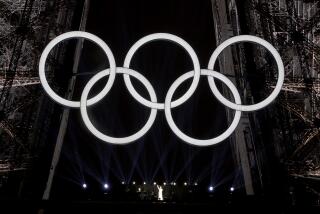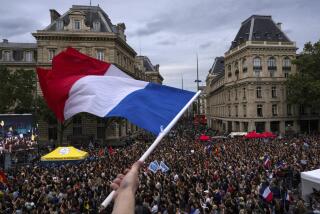Protests greet Olympic torch in London
- Share via
LONDON — The Olympic torch made its way under heavy police guard through 31 miles of raucous protests across London on Sunday, amid mounting calls for European leaders to boycott the opening ceremonies in Beijing to protest China’s human rights record.
With shouts of “Free Tibet!” and “Shame on China!” from the crowds, the torch occasionally had to be sheltered on a bus, while police scuffled with demonstrators who leaped in to try to halt the parade. In one case, a protester briefly grabbed the torch; in another, a man in a yellow jacket blasted an extinguisher at the flame.
Chinese counterdemonstrators waved their nation’s red-and-gold banner and shouted, “Shame on you!” at the protesters who swept into the street near the British Museum.
There were at least 35 arrests on an unusually snowy spring day that helped turn parts of central London into temporary bedlam.
The protests highlight Europe’s growing unease with supporting the Olympics in the face of the Chinese authorities’ brutal crackdown in Tibet last month and its harsh criticism of Tibet’s exiled spiritual leader, the Dalai Lama. Critics also cite China’s record of stifling dissent, including the arrests of 31 journalists.
French President Nicolas Sarkozy was the first European leader to raise the possibility of not attending the Aug. 8 opening ceremonies in Beijing.
“Our Chinese friends must understand the worldwide concern that there is about the question of Tibet, and I will adapt my response to the evolutions in the situation that will come, I hope, as rapidly as possible,” Sarkozy said last month. Asked about a boycott, he said he would “not close the door to any possibility.” Officials and politicians in Germany, the Czech Republic, Estonia and Poland have also spoken in favor of skipping the opening ceremonies.
“Beijing has to decide. It should immediately start negotiations with the Dalai Lama. If not, I consider a boycott justified,” Hans-Gert Poettering, the German president of the European Parliament, told the German weekly Bild am Sonntag last month. “We do want successful Games, but not at the price of a cultural genocide of the Tibetans.”
A boycott appears to have substantial public support in Europe. However, it has not attracted widespread endorsement among government leaders, who have misgivings about alienating an important trade partner and boycotting an event meant to symbolize international harmony.
In Italy, Olympic chief Gianni Petrucci said his nation’s participation was “not up for discussion -- there are athletes who have been training for this for four years.” Silvio Berlusconi, expected to become prime minister after elections this month, said the athletes were free to make their own decisions, but that the Olympics should be considered a chance “to take a little bit of freedom” to China.
In Britain, which is to hold the 2012 Summer Olympics, Prime Minister Gordon Brown has stated unequivocally that he will be in Beijing on Aug. 8, drawing immediate condemnation from an opposition leader.
But Brown has also agreed to meet the Dalai Lama when he visits London in May. The move is certain to antagonize China, which seized control of Tibet in 1951. China’s crackdown last month in the Himalayan region was triggered by sometimes violent protests against its rule.
“I think we have got to bear in mind that although there has been a huge amount of controversy now surrounding the Olympics, because of what has been happening in Tibet, the Dalai Lama himself has made it clear that he does not want . . . there to be a boycott of the Olympics,” Brown said. “And I think we have got to bear in mind the views round the world that the Olympics should go ahead as a sporting occasion.”
Britain’s Prince Charles notified Tibetan activists in January that he would not attend the opening ceremonies.
Four previous Olympic Games witnessed partial boycotts spurred by political protest, starting in 1956, when Switzerland, the Netherlands and Spain joined a boycott to protest the Soviet Union’s seizure of Hungary.
In 1980, 30 Western nations boycotted the Moscow Olympics to protest the Soviet Union’s war in Afghanistan. Four years later, the Soviet bloc, save Romania, retaliated by skipping the Games in Los Angeles to protest the “anti-Soviet and anti-communist activities in the USA.”
The 1976 Montreal Olympics saw more than 20 African nations exit to protest the presence of New Zealand’s rugby team, which had broken an international boycott to play South Africa in the run-up to the Games.
European leaders now face widespread public hostility toward China over its recent crackdown. Nearly 60% of respondents to a recent newspaper survey in Switzerland favored a boycott of the opening ceremonies, though the same percentage wanted Swiss athletes to participate in the Games. In Denmark, a poll showed half the public wanted to boycott the ceremonies, while in France, 53% in a poll wanted to boycott the Games.
“What’s striking to me is that European public opinion, across borders and very often across party lines, has been rallying against China on Tibet,” said Francois Godement, head of the Asia Center in Paris.
“In terms of public diplomacy, China is losing in Europe, and this is a really new phenomenon if you look at the recent past,” he said. “The way they are demonizing him [the Dalai Lama] doesn’t go down well with the European public.”
The European Parliament is expected Thursday to debate a resolution introduced by Thomas Mann, head of the body’s Tibet Intergroup.
“If the central government in Beijing doesn’t give way, all possible steps should be discussed, from protests during the Games up to political and economic boycott measures,” Mann told Sueddeutsche Zeitung, a leading German daily. “We have various options: We can boycott certain parts of the Games with the remote control of our TVs, or we can boycott Chinese products.”
There has been widespread public ambivalence, not least among athletes, to the idea of a full boycott of the Games.
“I’ve got the feeling that sport is abused when the problem is not solvable by politicians and diplomats,” Thomas Wessinghage, a German middle-distance runner and potential medal candidate in 1980 who was prevented from going to the Moscow Games, said in an interview.
“There is an ethnic group which lives under the power of China. This has nothing to do with sport,” he said. “Now, some politicians take the sport and say, ‘Look, this is our best weapon.’ Then I have to ask them: Where are the other measures?”
Amid the tumult in London, as the flame made its way from Wembley Stadium in northwest London to the O2 Arena in Greenwich, many of those who showed up to cheer the torch ended up applauding the protesters as well.
“It’s the only way they’re going to make people fully understand what’s going on,” said Philippa Hayward, who had come to visit the British Museum but ended up amid the mayhem outside. “I admire them enormously for it.”
The flame’s only North American appearance will be in San Francisco on Wednesday.
--
geraldine.baum@latimes.com
Murphy reported from London and Baum from Paris. Times staff writer Tracy Wilkinson in Rome and special correspondent Christian Retzlaff in Berlin contributed to this report.
More to Read
Sign up for Essential California
The most important California stories and recommendations in your inbox every morning.
You may occasionally receive promotional content from the Los Angeles Times.













